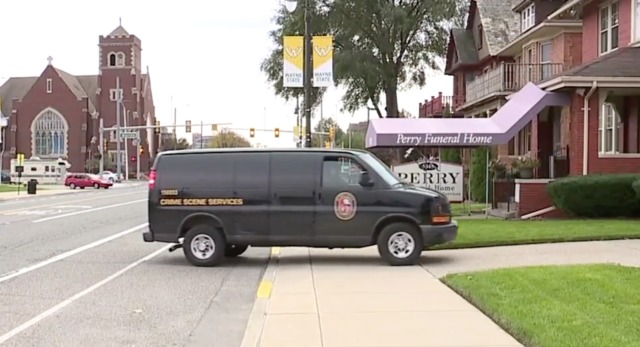Detroit funeral home: infant remains of fetuses removed.
n a rapidly widening investigation of metro Detroit funeral homes, Detroit Police executed a search warrant at a west-side funeral home near Wayne State University and removed 63 remains of fetuses, police said.
Custody of the remains — found at the Perry Funeral Home, on Trumbull just north of Warren Avenue — was turned over to state investigators, who immediately declared the business closed and its license suspended, according to a statement from Michigan Licensing and Regulatory Affairs.
Of the grisly total, there were 36 fetuses stored in boxes and another 27 found in freezers, police said. Friday’s discovery of the decomposed remains followed a similar grisly finding last week at the defunct Cantrell Funeral Home on Detroit’s east side, where 11 infants’ remains were found after an anonymous letter arrived in the offices of state regulators in Lansing.
Friday’s raid at the Perry home came after Detroit homicide detectives also raided QA Cantrell Funeral Home in Eastpointe to investigate a potential connection with the fetuses found in the ceiling of Cantrell Funeral Home in Detroit. Detectives seized computers, business cellphones, and paperwork, according to a news release. They also raided the home of the owner, Anetta Cantrell, the widow of the deceased founder of the Detroit home with the same name.
Detroit Police Chief James Craig said he was stunned.
“I’ve never seen anything (like this) in my 41 and a half years” as a police officer, Craig said, at a news conference on Friday, adding: “It’s disturbing, but we will get to the bottom of this.”
Craig said police were tipped off to violations at the Perry Funeral Home by a father involved in a civil suit over the improper burial of his infant daughter.
Lawyers for the father as well as the mother of the deceased baby said the parents are plaintiffs in a lawsuit that they hope will allow them to represents dozens, perhaps scores, of parents whose infant remains were improperly handled by the Perry Funeral Home. The case representing could become a class-action lawsuit representing every parent who comes forward with a similar complaint, Troy attorney Peter Parks said.
“We already thought we had a strong case, and then when the news starting hitting the media about Cantrell, our clients agreed that we should take what we knew to the highest level” of the Detroit Police Department, Parks said Friday.
Parks said he and his cocounsel on the case, attorney Daniel Cieslak, presented what they knew on Friday to a meeting led by Craig that included “the FBI, Michigan State Police, Wayne County prosecutors, the Michigan Attorney General’s Office, LARA (the state’s Department of Licensing and Regulatory Affairs), you name it.”
The two attorneys said they believe many more infants’ remains may be found in the improper possession of the Perry Funeral Home, perhaps as many as 200, based on their research of log books kept by the Wayne State University School of Mortuary Science. The funeral home routinely deposited infant remains at the WSU school’s morgue, then failed to follow up with parents’ wishes for the remains to be used in research by the WSU School of Medicine, they said.
“I’m really wondering where all the rest of them are,” Cieslak said late Friday. The lawsuit filed by the two charges that Perry may have fraudulently billed Medicaid, as well as the Detroit Medical Center, for burials it never performed. The lawyers said they can’t estimate how much money might be involved, “but it must be significant,” Parks said.
“We already have people calling us, after seeing the news, saying ‘this happened to me,'” he said.
Parks and Cieslak filed the civil suit against Perry — also naming the DMC, Harper/Hutzel Hospital, Wayne State University and Knollwood Memorial Park Cemetery as defendants — on behalf of Detroiters Rachel Brown and Larry Davis. Their deceased daughter, Alayah, suffered at birth from severe respiratory problems and survived only 27 minutes after she was born on Dec. 8, 2014, they said. Her remains were among those improperly stored by Perry at the WSU morgue.
“If our class action gets certified, we will make every effort to identify every single one of those fetuses” that had been improperly handled by Perry, and to track down the parents, Parks said.
Parks said the case “involves issues that quite clearly touch on matters that as a society we hold as sacred” — specifically, “honoring the final disposition of loved ones.”
In a statement issued late Friday by inspectors for the State of Michigan’s Corporations, Securities & Commercial Licensing Bureau, regulators in Lansing said they found “heinous conditions and negligent conduct” at the Perry Funeral Home, including numerous failures to certify death certificates and obtain proper permits for burial.
Friday’s findings point clearly toward criminal offenses of state laws regulating funeral homes that could be felonies “punishable by imprisonment for not more than 10 years or a fine of not more than $50,000 or both,” said a statement from the agency.















